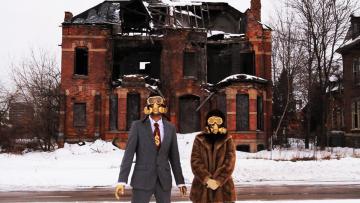'Detropia' paints haunting picture
There, but for the grace of geography and hi-tech options, goes Pittsburgh -- to a place called "Detropia."
That neologism, combining "Detroit" and "dystopia," is the title of a wrenching but mesmerizing documentary with a much softer touch than Michael Moore's about our fatally stalled Motor City.
What was once America's fastest-growing metropolis is now its fastest-shrinking one -- from 1.8 million in 1980 to about 850,000 now -- a 50 percent loss of population in three decades.
Directors Heidi Ewing and Rachel Grady ("Jesus Camp") open their chronicle with a montage of post-apocalyptic proportions: a city containing more than 100,000 empty homes and vacant lots, including whole vacant skyscrapers from Detroit's once-glorious belle epoque. Video blogger Crystal Starr takes us on an exploration of those and other graffiti-covered ruins, communing with ghosts as she wonders, "What was there? Who was there?"
What was there, of course, was the auto industry and the workers who made it -- and America's middle-class standard of living -- great. UAW Local 22 president George McGregor is a fine soulful example of them and of all the Detroiters who won't (or can't) leave and are painfully nostalgic for the booming past.
The only thing really booming there now is the demolition business, as we see through the passenger-seat camera on Mr. McGregor's tour past the half-mile-long Cadillac plant, now derelict, where he started in 1968. "When the plant left, the neighborhood left," he says, simply and sadly.
The present is sad, as well. Mr. McGregor is on his way to a union contract meeting for American Axle, one of the last big local subsidiary manufacturers. The company's offer is a $3 wage cut (from $14 to $11 an hour) -- or relocation of the plant and its jobs to Mexico (average wage $2.92 an hour). Three guesses what happens.
But Mexico is an outsourced labor paradise compared to the manufacturing giant-thief hovering like a Grim Reaper over all American industry: China (average wage 81 cents an hour). How do you compete against virtual slave labor? Although the recent bailouts averted total disaster, the auto industry remains a shell of its former self. Half of Michigan's manufacturing jobs evaporated between 2000 and 2010 -- along with 50,000 factories and 6 million jobs nationally. How much further down can you downsize?
Even so, all is not gloom and doom in "Detropia." There's upbeat schoolteacher Tommy Stevens, presiding over his Raven Lounge side business with optimism. And there's the wonderful framing device of the Detroit Opera House, fallen on hard times like everybody else but struggling successfully to keep its head and glorious voices above water. Archival footage reminds us of Detroit's bustling heyday, with vintage kitschy ads -- glamorous girls and cars on "the highways of tomorrow," joyriding through the American Dream.
We're also introduced to some of the hip young artists who've been moving to Detroit to take advantage of the incredibly large and cheap urban living-and-working spaces available. I'll leave it to you to decide whether the directors are lauding or mocking such newly arrived performance artistes as a duo called the Hygenic Dress League. Their macabre capitalism spoofs strike me as more wrist-cutting than cutting-edge.
"Detropia" is less forceful than previous Ewing and Grady collaborations -- the superb, Oscar-nominated "Jesus Camp" (2006), about kids at a heavy-handed evangelical Christian summer camp, and "12th & Delaware" (2010), about even more heavy-handed anti-abortion tactics. But it is technically better, winning the Sundance festival's best editing award. It features a perfect moody score and terrifically artful cinematography by Tony Hardmon and Craig Atkinson. Blight never looked more beautiful.
Post-industrial agony is all too familiar, locally. Motown and Milltown have a sad lot in common. They built America's wheels; we built America's steel. Now you can't find much of either (or anything) made in America.
The film offers no solutions. There may not be any. Detroit's Mayor Dave Bing and the other officials interviewed admit that. The Confederacy of Dunces -- business, labor and government -- whose complacency let Humpty fall off the wall hasn't figured out how to put him together again.
"Detropia" is an elegy -- or eulogy. Haunting shots of scavengers pawing through demolished buildings for salvageable materials illustrate the most bitterly ironic fact: The top U.S. export to China today is scrap metal.






